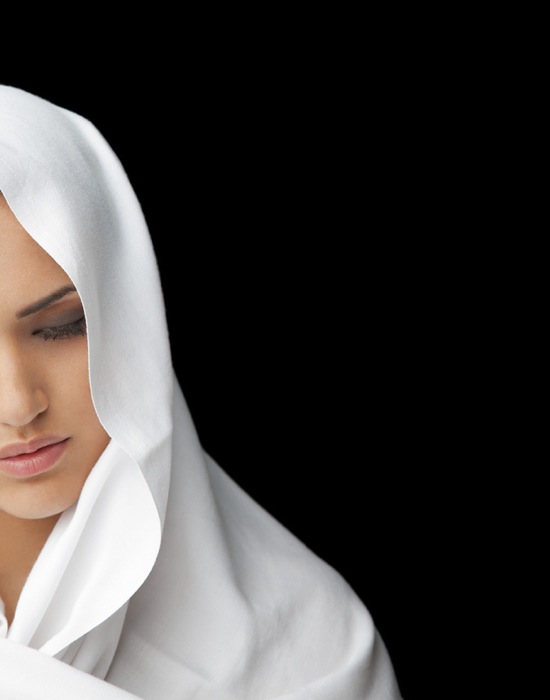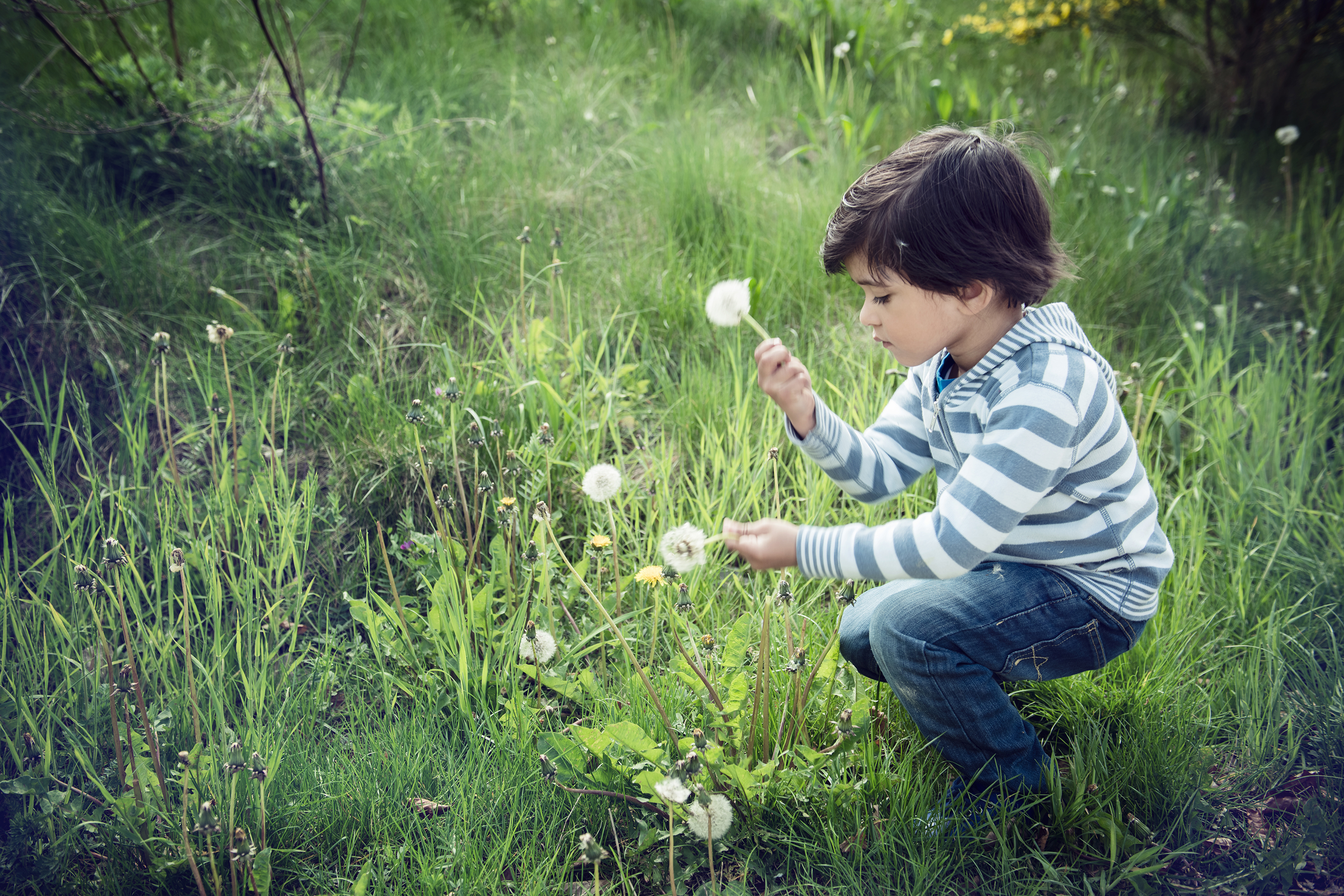When I saw her, I averted my gaze and walked toward my locker. I adjusted my backpack on my shoulder and squinted my eyes as if in concentration. I pretended that I had not seen her, that she and I did not know each other outside of school—and that I did not know she was Muslim too.
But the image of her quickly shoving the cloth into her schoolbag would not leave me. I felt choked up, and sadness created an uncomfortable sensation in my chest. I didn’t want to think of it. I liked Rashida. No, we weren’t “friends,” but we enjoyed each other’s company at masjid social events. There, amongst Muslims, Rashida wore the white single-piece hijab that so many of us favored—the same white cloth that was now stuffed in the bottom of her bag. She now walked confidently down the public school hall and laughed with schoolmates. Her hair was neatly styled and complimented her beautiful brown complexion, but I could not look at her for long. I feared that my eyes would betray me—or that, if our gazes locked even if only briefly, I would betray her…
Embracing Niqaab (the Face Veil)
I never imagined that I would ever put on niqaab. My parents converted to Islam the year I was born, so I grew up Muslim. But in the small American Muslim community where I’d lived, no one wore the face veil. There were women in African-style head-wraps, single-piece pull-on hijabs, and there were even those who chose not to cover at all. But no one covered her face. I, like so many other Muslims, considered the niqaab a part of Arab custom, a cultural statement symbolizing the backwardness of “so-called Muslim countries” that oppressed Muslim women.
So when I happened upon Islamic evidence that the niqaab actually had roots in Islam itself and was not merely an archaic reflection of Arab culture, I was genuinely intrigued…. And I began to ponder wearing the face cover myself.
What finally inspired me to wear niqaab was realizing that it was, at the very least, highly recommended in Islam—mustahabb. I was at first a bit nervous and uncomfortable going out in public wearing it, but I gradually grew used to the niqaab and ultimately grew fond of it.
Though my initial youthful zeal shielded me from even reflecting on the meaning of this monumental decision in American society, the more I lived, the more I was forced to analyze the practical adjustments I would have to make if niqaab were to remain a part of my life. For quite some time, this analysis was a private one. Because my husband was the sole provider of the family, I as a homemaker never had to worry about the reality of working outside the home and facing opposition to my Islamic dress on a daily basis.
However, on Tuesday, September 11, 2001, everything changed.
Change
For the first time in my adult life, my safety as an openly practicing Muslim was threatened. The attacks on the World Trade Center were blamed on Muslims, and some “neighborhood terrorists” took to harassing and attacking local Muslims. These terrorists would attack women walking down the street, men getting gas, and even Muslims praying privately in a masjid. No one ne was safe.
Muslims lost their jobs. Muslim women were asked to remove their hijab. Muslims were put in jail. Others just disappeared.
I felt as if everything familiar was shifting beneath my feet, and I had no power to steady it.
Nevertheless, groceries needed to bought, bills needed to be paid, and bank deposits and withdrawals had to be made. I sometimes had to take a flight to visit family or I had to enter a government facility to complete some paperwork. I had to make appointments at the doctor and dentist and drive my daughter to and from school.
Slowly, my private reflections about the practicality of wearing niqaab in American society were becoming less theoretical as I faced the daily reality of what it actually meant.
Though it was not the conclusion I coveted, I finally decided it was wisest to make exceptions from time-to-time. If the greater good could be gained by wearing the niqaab, I wore it. If the greater good (such as my general safety as a Muslim woman) could be gained without the niqaab, I wore only the hijab and outer garment that Allah required of me.
But in my heart I ached for an environment where I didn’t feel compelled to make such exceptions. I longed to live in a Muslim land where I would be free to dress in the way most beloved to me… and to Allah Himself.
‘It Was Never for Allah’
“If you wear it then take it off, it was never for the sake of Allah in the first place,” a sister said, her loud voice rising from where she sat in the sister’s prayer area.
“I don’t want to be wishy-washy,” another sister agreed, contorting her face. Her niqaab was pulled down under her chin as she relaxed in women-only company. “On today, off tomorrow,” she mocked condescendingly.
“It’s almost better if she never wore it!”
“Yeah, I know.” The sister nodded. “I feel bad for my husband. He has to see these women’s faces when he comes to the masjid.”
“I don’t know what’s going on with these sisters!”
“Either wear it, or don’t,” a sister suggested wrinkling her nose.
“Yesterday, I saw another sister who took off her niqaab.”
The women grunted and rolled their eyes in disappointment, shaking their heads knowingly.
“…And I just glared at her and turned my back. I wanted let her to know how disappointed I was in her.”
I felt suffocated in my niqaab as I drove home that night. Thoughts stormed my mind, and the heat of offense burned my face.
So if I don’t pray Tahajjud every night, I thought furiously, wishing I’d had the strength to speak these thoughts to the sisters themselves, then it’s not for the sake of Allah? And if I give charity today but not tomorrow, it’s better if I never gave it at all! And should I say to a fellow Muslim, “Either do this good deed every day, or never do it. This is better for your soul”?
And who says we cover so men will never see us? I fumed. Even the scholars who say niqaab is obligatory list exceptions to wearing it.
I cover for the sake of Allah! my heart cried. For the sake of my soul—not to make men’s lives easier! …And certainly not to appear “sincere” to other Muslims…
A Stolen Hijab
Being in the company of Muslims who defined Islamic sincerity as an outward action determined by onlookers was a painful experience for me. I’d never considered my choice to wear niqaab as relating to anyone other than myself and my Lord. I viewed it as an opportunity to earn extra blessings. I was conscious of the angels writing for me, but I hadn’t factored in the possibility of people keeping tabs on me as well.
Naturally, I knew the choice to wear niqaab—like the choice to do any outward Islamic act—was visible to others. But I didn’t know that this visibility meant that others would call me to account for what they saw. I’d imagined that so long as I was committing no visible sin, Muslims would generally leave me and other Muslims alone in our efforts to please Allah.
But I was wrong. This was a new phase of learning for me.
I was indignant. I was hurt. I was offended.
And I felt betrayed.
It was as if my hijab no longer belonged to me and my Lord.
It was as if my hijab had been stolen from me.
It was at this point that I understood Rashida better. No, I could never condone her choice. But I could certainly understand her dilemma.
How I’d felt amongst the judgmental sisters was how Rashida had felt amongst her schoolmates.
Either you do only what we do, or you don’t belong.
Amidst our non-Muslim peers, Rashida had chosen the former, I the latter.
But as I reflected on this same message coming from Muslims—regarding something that was not necessarily even required of me—I wondered why I had to choose at all.
Most importantly, though, I wondered when I’d have strength to take my hijab back…so that it would, once again, belong to only me and my Lord.
(Photo Source: Umm Zakiyyah)
This post was originally posted on UmmZakiyyah, authored by Umm Zakiyyah.
Copyright © 2012, 2014 by Al-Walaa Publications. All Rights Reserved.
Originally published via SISTERS Magazine in 2012






About 10 years ago at Adams center VA I was sitting with a group of peers and one lady asked another lady who was wife of a very religious person that if I had to choose between two friends one is perfect other than covering with Hijab and other is Hijabi but gossip a lot and back bite. I was so surprised that the learned women told us that she should not be friend with non Hijabi as Hijabi can Stop gossiping any time. I did not say anything at that time but thinking back, it makes me angry.
For a long time, I also felt that my hijab had been stolen from me. I, too, covered my face for a long time. I had many Muslim women come to me for spiritual support in their choice to cover with a headscarf or the face veil. I was well versed in evidence from the Qur’an and hadeeth, scholarly arguments etc., in support of covering of the hair and the face. However, I have undergone many changes in the past 3 years that have been necessary for my own growth. I attended my brother’s wedding and I chose to take off my scarf, entirely. This wasn’t to fit in. This was for me – to begin the journey towards radical acceptance – something that one day I woke up to and realized I needed because I realized how broken my self image really was since childhood. And even though my family is Catholic, and even though they have not been thrilled about me converting throughout the years, my brother asked me why I was losing commitment in my faith because of my decision to remove my scarf for that day. I said, “I’m not.” But I learned a huge lesson.
That is that no matter who, when and where – there is always going to be someone who is disappointed and who chooses to judge another from their very limited lens. We all do it to others. What truly matters is that we are who we need to be at any given moment and that we know why we are doing what we are doing. So now, my life is about self-acceptance and empowerment.
Thank you for writing this and sharing.
With Hope,
Beth